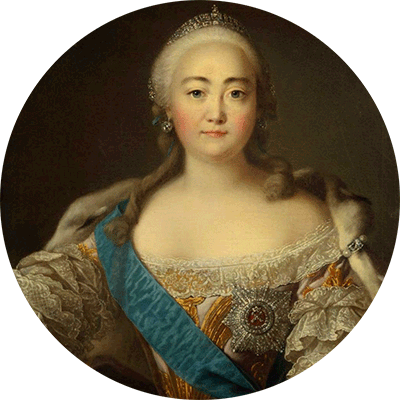1741-1762 Empress of Russia.
Elizabeth of Russia successfully continued her father Peter the Great’s policy. She set new standards for European courts and was a role model for Catherine the Great.

Background
Lived: 1709-1762.
Over the preceding sixteen years the monarchy in Russia had grown weak. The offspring of Ivan V, their distant relatives, and Baltic German supporters had dominated the court.
Rise to power
When in 1740 an infant Ivan VI was crowned, Elizabeth decided to take the throne by force. She was supported by Peter the Great’s loyal Preobrazhensky Regiment. The coup in 1741 went smoothly. Ivan VI was imprisoned and people welcomed the new empress.
Elizabeth was a charismatic figure, like her father. She had a the broad support of the people, who wanted to see a return to the times of Peter the Great.
In her policies, she pursued the fulfillment of her father’s ideas. She founded Moscow University and the Russian Academy of Arts. During her reign, no death sentence was ever carried out because on becoming Empress, she had vowed she would never sign one.
Foreign policy
Her foreign policy was a success, as the prestige of Russia in international affairs only grew. She knew how to choose good advisors, such as her chief advisor Alexey Bestuzhev-Ryumin.
Russia’s alliance with Austria made gains in the Seven Years’ War against Frederick the Great of Prussia.
Personal
Elizabeth knew how to enjoy life. She made the Russian court as splendid and shining as the court of Louis XV. Elizabeth was a woman of great beauty, and she loved being surrounded by admirers. Alexey Razumovsky was one of her favourites. She is reported to have had a collection of 15,000 dresses.
Elizabeth
1741-1762 Empress of Russia.
Elizabeth of Russia successfully continued her father Peter the Great’s policy. She set new standards for European courts and was a role model for Catherine the Great.
Background
Lived: 1709-1762.
Over the preceding sixteen years the monarchy in Russia had grown weak. The offspring of Ivan V, their distant relatives, and Baltic German supporters had dominated the court.
Rise to power
When in 1740 an infant Ivan VI was crowned, Elizabeth decided to take the throne by force. She was supported by Peter the Great’s loyal Preobrazhensky Regiment. The coup in 1741 went smoothly. Ivan VI was imprisoned and people welcomed the new empress.
Elizabeth was a charismatic figure, like her father. She had a the broad support of the people, who wanted to see a return to the times of Peter the Great.
In her policies, she pursued the fulfillment of her father’s ideas. She founded Moscow University and the Russian Academy of Arts. During her reign, no death sentence was ever carried out because on becoming Empress, she had vowed she would never sign one.
Foreign policy
Her foreign policy was a success, as the prestige of Russia in international affairs only grew. She knew how to choose good advisors, such as her chief advisor Alexey Bestuzhev-Ryumin.
Russia’s alliance with Austria made gains in the Seven Years’ War against Frederick the Great of Prussia.
Personal
Elizabeth knew how to enjoy life. She made the Russian court as splendid and shining as the court of Louis XV. Elizabeth was a woman of great beauty, and she loved being surrounded by admirers. Alexey Razumovsky was one of her favourites. She is reported to have had a collection of 15,000 dresses.
Alexey Bestuzhev-Ryumin